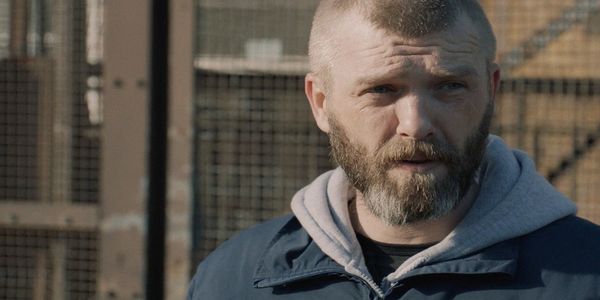GHOST: Quiet Drama. Boisterous Finale.

Spent most of my life watching and discussing movies. Writing…
When I began watching this film, little was known to me other than what the trailer provided. I thought I was to watch a gritty crime drama set in the London underworld. What I got came as a pleasant surprise. Ghost, written and directed by relatively unknown Anthony Z. James, tells the story of Tony Ward (played by Anthony Mark Streeter), an ex-con who has just served ten years in prison for crimes unknown. On his first day of freedom, he meets up with his estranged son Conor (Nathan Hamilton) who is grown-up now and managing a small flat, fixing odds and ends to pay the bills. What follows is a slow burn father/son drama that ramps up meticulously to a jarringly effective powder keg finale.
Doing More With Less
What makes Ghost such an interesting experience was the quiet tone of the overall narrative. There are times where even the most mundane of acts, say, lighting a cigarette after a long finished conversation between characters, doesn’t immediately cut away to the next scene. Instead, the direction stays on the characters through these moments, silently allowing the story to marinate for both the audience and the actors. These long take choices seem out of place at first, until you realize the purpose is to give the characters time to take note of what just transpired, leaving each segment with as many questions as answers.

The camera work felt off on occasion due to its subtly digital quality. In a strange way, this adds a certain reality to the piece. After doing a bit of research into the production, I was taken aback by Anthony Z. James’ choice to shoot the entire film on an iPhone. This is nothing new or groundbreaking, having been done in films like Steven Soderberg’s Unsane (2018) and the Park Chan Wook short Night Fishing (2011). The quality is sharp for the most part, only showing its hand in certain types of light while still delivering a professional air to the final product.
Like Father, Like Son
The crux of the film relies heavily on the characters’ interactions, even down to the slightest role. Each scene does well to pull back the curtain on why Tony was incarcerated and the toll it took on his family and former compatriots. Ghost sends its time wisely by showing a realistically raw day-in-the-life perspective of the two leads. Tony, who seems like a quiet man trying to find redemption for his past ills juxtaposes perfectly with his estranged son Conor who, despite coming off as a well-adjusted fellow, shows his darker side when confronted by adversity, be it personal or confrontational. We get a deeper perspective of the father/son dynamic with each tiny reveal into their pasts and how it shaped them over a decade’s time.
Another strong performance comes from actor Russell Barnett who plays Dominick Clarke, Tony’s former partner in crime. Portrayed as a down on his luck businessman, Dominick’s part to play is staged with a deft hand, never giving too much before the time is right. Barnett’s knack for smooth-talk coupled with his tastefully gruff appearance, leaves you guessing as to his motives throughout by playing the role as subtly unlikable, yet deceivingly trustworthy.
Then It All Comes Together
The third act does well to leave the audience with a false sense of security in the final minutes. Unsteady relationships are rectified and the direness of the situation transforms into a hopeful narrative for those deserving of a prosperous conclusion.
Suddenly, plot points set up early on culminate brilliantly to bring the story full circle just as you settle into the glimmer of hope dangled teasingly within reach. The last scene is a beast of performances all around. Visceral, nerve-racking, and painful, everything down to the settling feels suffocating for Tony and Conor. In a world built on quiet anger, the brutality beneath the surface bubbles up to a scalding boil, showing the true nature of the men we thought we had come to know well. These final minutes unveil a much deeper dive that begs the question; is a man capable of redeeming his past self when the world expects the worst from him?
Writer/Director Anthony Z. James weaves an unsuspecting tapestry in both his eye for detail and strong world-building. Ghost ultimately haunts the viewer with tight dialogue, brave character development, and powerful storytelling that gives you just enough of each before the explosive final act. This is a definite recommendation for those looking for an engaging study of how one’s past can shape those around them.
Is there a film you would recommend with a third act shift that left you speechless? The Film Inquiry Community would love to hear from you. Post your comments below and keep the conversation going.
Ghost is available for rent or purchase on select streaming services.
Watch Ghost
Does content like this matter to you?
Become a Member and support film journalism. Unlock access to all of Film Inquiry`s great articles. Join a community of like-minded readers who are passionate about cinema - get access to our private members Network, give back to independent filmmakers, and more.
Spent most of my life watching and discussing movies. Writing is a way to keeping the conversation going with the rest of the world.













